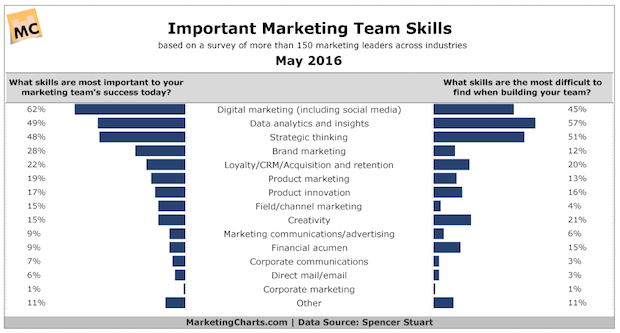“Every time the USPS tries to operate like a real company,” says an excellent article in Bloomberg BusinessWeek, “government happens.” The article “Making No Cents” describes the numerous regulatory and crony political forces that have shaped the USPS, including the innovations and initiatives that were never implemented, and how USPS was ahead of its time. A lot of this is spilled milk and its associated crying, but interesting nonetheless.
* * *
If you want to get a sense of where industries are headed, examine who they're hiring next. That seems to be the lesson of a research report by Spencer Stuart and summarized in this chart about the skills that are important to success in marketing and those that are the most difficult to find. Marketers are confident in their strategies but not confident in their implementation. They want strategic thinkers, skills in digital marketing, and data analytics.
Printers take note: direct mail and e-mail marketing are at the bottom of their list. They know where to get those, and they know how to do it. Business opportunities are always where there are greatest difficulties. As I have told those new to the consulting profession “when you see confusion in the marketplace, run toward it.” Marketing is successful when it solves problems. Are you solving problems or just selling mail services?

* * *
Okay, this story is about Ireland, but it has a general lesson. It refers to “cloud working,” the idea that telecommuting and mobile computing are essential today. It's all the more reason why printers need to invest in effective web-to-print technologies that are right for their customers and make transactions and interactions easy.
* * *
The public relations industry has grown by leaps and bounds in recent years as non-advertising media have gained prominence and importance. This podcast about the business side of the PR profession offers some inside knowledge.
Insight into the PR business
* * *
There are high costs of low interest rates according to the Wall Street Journal. The destruction of income from savings is one of them, as is the ability to save and compound for future needs. These problems seem obvious, but central bankers and governments think otherwise.
* * *
The new overtime rules are getting a lot of attention, as they should. They will create some unintended consequences that make the labor markets more complex, and can affect the flexibility of the workforce, and in turn, expand the market for freelance services. Employers like the certainty of salaried workers, and those salaried workers like the flexibility they have to “make up hours” in various scenarios as they need them. The “I have a doctor's appointment tomorrow but I'll work through lunch” flexibility built trust and goodwill in workforce relationships. Now all those little things make have to be carefully documented and micromanaged to avoid potential overtime violations. Companies that found telecommuting to be a good option for parents and caregivers may prefer to have workers on site as much as possible. One of the big winners may be software companies than manage hours of previously salaried workers, and ways of replacing their work with better information systems may do well, too. Why? Because the costs of non-compliance with the new law's guidelines create new risks, and those risks can be measured. Any risk that can be measured can be used to quantitatively justify the purchase of an alternative process.
There may also be new efforts to outsource to outside companies, some of which may be in world locations not subject to the rules. Businesses may change hours and be less flexible on the customer-facing sides of their business. This creates a greater need for updated job descriptions as companies ensure they are in compliance with the regulations and the new “duties tests” that determine whether or not a job is exempt.
These can also affect the nature of startup companies and the interest that many young people have in trading their time (which makes up for their inexperience) for low pay but the promise of a long term payout in the form of stock options and equity.
* * *
How can Uber and Lyft have problems in a high tech city noted for its progressive culture? They found out you “don't mess with Texas.”















Discussion
Only verified members can comment.